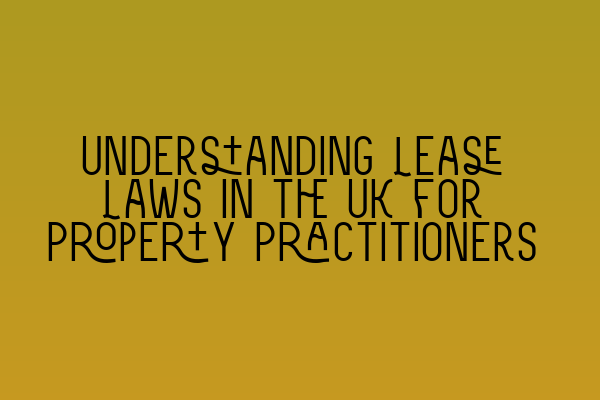Understanding Lease Laws in the UK for Property Practitioners
As property practitioners, it is essential to have a thorough understanding of lease laws in the UK. Lease agreements play a crucial role in property transactions and can have significant legal implications for both landlords and tenants. In this blog post, we will explore the key aspects of lease laws in the UK, providing you with the necessary knowledge to navigate this complex area of property law.
1. What is a lease?
A lease is a legal document that grants an individual or organization the right to occupy and use a property for a specific period of time, known as the lease term. It outlines the rights and responsibilities of both the landlord and the tenant, including rental payment arrangements, repair obligations, and termination clauses.
2. Types of leases
There are various types of leases that property practitioners should be familiar with, including:
a. Assured Shorthold Tenancies (ASTs): This is the most common type of lease for residential properties in the UK. ASTs are usually granted for a fixed term of six months or more and provide tenants with a minimum term of six months’ protection.
b. Commercial leases: Commercial leases are used for non-residential properties such as offices, shops, and industrial units. These leases can be more complex and often involve additional considerations such as rent reviews, service charge provisions, and break clauses.
c. Ground leases: Ground leases are commonly used for leasehold properties where the property is built on rented land. These leases can last for several decades, and the tenant may be required to pay ground rent to the landlord.
3. Lease terms and conditions
Lease agreements typically include various terms and conditions that govern the relationship between the landlord and tenant. These can include:
a. Rent: The lease will specify the amount of rent payable, how often it should be paid, and any provisions for rental increases during the term.
b. Repair and maintenance: The lease will outline the respective responsibilities of the landlord and tenant regarding repairs and maintenance. It is important to carefully review these provisions to determine who is responsible for specific repairs and whether there are any limitations or exclusions.
c. Termination: The lease will include provisions regarding how the agreement can be terminated by either party. This may include notice periods, break clauses, and conditions for early termination.
d. Subletting and assignment: The lease will set out the conditions under which a tenant can sublet or assign the property to another party. These provisions can be restrictive or permissive, depending on the landlord’s preferences.
4. Legal considerations
When dealing with lease agreements, property practitioners must be aware of several legal considerations, including:
a. Statutory protections: Tenants in the UK benefit from various statutory protections, including protection from eviction, protection against unfair terms, and the right to challenge unreasonable service charges. It is important to ensure that lease agreements comply with these statutory protections.
b. Consumer protection rights: In certain situations, tenants may be considered consumers and benefit from additional consumer protection rights. Property practitioners must consider these rights when advising clients on lease agreements.
c. Planning and environmental considerations: Lease agreements must comply with planning and environmental regulations. Property practitioners should ensure that leases address any planning restrictions and environmental obligations.
d. Landlord and tenant obligations: Both landlords and tenants have certain obligations under lease agreements, including payment of rent, maintenance of the property, and compliance with any additional covenants outlined in the lease. Failure to meet these obligations can result in legal disputes.
5. Seeking legal advice
Given the complexity of lease laws, property practitioners should strongly recommend that their clients seek legal advice before entering into lease agreements. A solicitor who specializes in property law can provide invaluable guidance and ensure that the lease agreement is watertight and in compliance with all relevant laws and regulations.
In conclusion, understanding lease laws in the UK is crucial for property practitioners. By familiarizing yourself with the different types of leases, lease terms and conditions, legal considerations, and the importance of seeking legal advice, you can effectively navigate lease agreements and protect your clients’ interests.
For further resources and preparation courses for the Solicitors Qualifying Examinations (SQE), check out the following articles:
– SQE 1 Practice Exam Questions
– SQE 1 Practice Mocks FLK1 FLK2
– SQE 2 Preparation Courses
– SQE 1 Preparation Courses
– SRA SQE Exam Dates
Disclaimer: This blog post is intended for informational purposes only and should not be considered as legal advice. For specific legal advice regarding lease laws in the UK, please consult a qualified solicitor.
